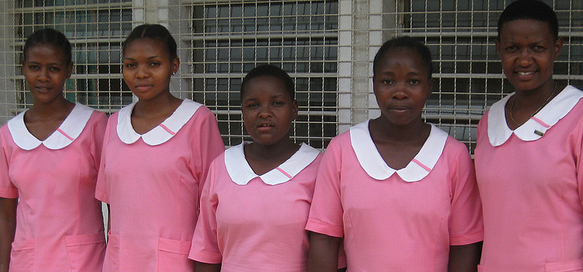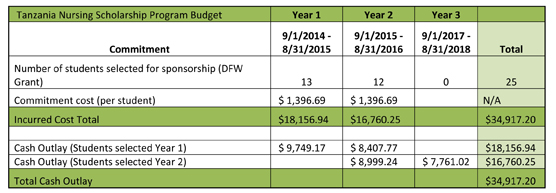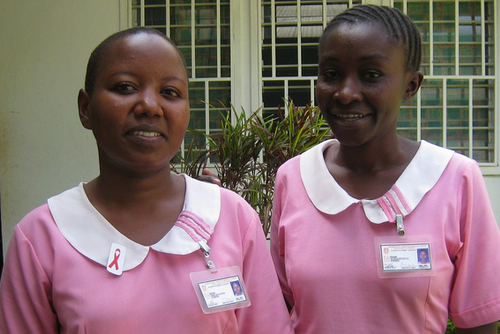
Mission
— John Hope Bryant, founder of Operation HOPE
The Tanzania Nursing Scholarship Program (TNSP) sponsors and promotes young women in Tanzania to achieve dual diplomas as registered nurses/midwives. Attaining professional status assures their financial stability and independence and allows young women to assist their families and communities to better health and well-being, thereby elevating the lives of all.
The TNSP is the recipient of a $35,000 DFW grant to be disbursed over two years, which will nearly double the number of students the organization can support. The program currently has 28 students in two Tanzanian nursing schools. DFW funding will expand the scholarships to 13 additional nursing students in the first grant year and 12 additional students in the second grant year (each student receives two years of sponsorship, so 25 additional students will be sponsored).
The vast majority of the students sponsored by TNSP come from a background of grinding poverty. The program currently sponsors a student who arrived at the nursing school barefoot and with no money. Another recipient’s sibling had been entered into an arranged marriage for the primary purpose of receiving a bride price that would be used to pay her sister’s school fees. Another sponsored student arrived at the school without any money after an escape from an unwanted arranged marriage. However the young women and their families have managed to pay for their first year of training, much of that first year is overshadowed by the likelihood the families will not be able to acquire the resources to send their daughters back for a second year, let alone a third.
Life Challenges of the Women Served
Beneficiaries of the TNSP are young women, typically 23-26 years of age. The older age group reflects the fact that education is often extended due to the student’s inability to pay school fees each year. The women are from small, rural villages, and often come from single-family homes or are orphans.
According to a 2012 UNESCO report titled “Tanzania Education Sector Analysis”, poor, rural girls face the greatest disparity in access to education: for every 100 urban boys completing primary school in Tanzania, only 53 poor rural girls do. At the post-primary levels, the gap continues to widen. Retaining the poorest students in primary schools and ensuring their transition to post primary cycles is a major challenge. Although the abolition of primary school tuition has reduced expenses, the poorest households still struggle to pay for uniforms, books, and fees. Insistence on girls fulfilling their traditional role in society, early marriage, and pregnancy also increase girls’ dropout rates.
Beyond the personal challenges of the students, the country is challenged by a severe shortage of health care professionals. According to the World Bank, Tanzania has only two nurses for every 10,000 people.
The Project
Admission to any of the government sponsored nursing schools requires the submission of an application by the prospective student to the Ministry of Health and Social Welfare. Students who meet admission requirements and are selected for placement are assigned to a slot at one of the government nursing schools. School staff meets the student for the first time at the beginning of the new school year. When the student arrives at the school, the school staff asks the new student to write two essays – one an autobiography and the other on why the student wants to become a nurse. It is through this means that the staff at the school is introduced to the student and the student’s background.
At the end of the first year of nursing studies the nursing school’s staff is aware of each student’s academic progress and financial need. The essays written by the students are also an important document for review of background. Student candidates are identified with the assistance of school staff. A member of the TNSP board or their in-country student coordinator reviews documentation, questions staff and conducts an interview with the student candidates. In the course of this process they explain the sponsorship program to the student candidates. TNSP representatives sometimes visit students’ families, when they live within a day’s travel.
Questions for Discussion
- Why doesn’t the program fund the first year of nursing school?
- In what ways do access to healthcare and access to education impact one another?
- What are some factors that contribute to the low quantity of healthcare workers in rural areas?
How the Grant Will be Used
DFW’s grant of $35,000 will directly impact the 25 young women who earn dual diplomas in nursing and midwifery, enabling them to experience the pride of accomplishment that comes with their achievement. The indirect impact is on their families and others in their villages. Once these young women are employed they tend to provide financial assistance to their families for basic needs, and typically support their siblings to attend school. The broadest impact will be an increase in the availability of healthcare in rural communities across the country. The average cost per student, just under $1,400 per year, covers tuition and all fees, room and board, health insurance, and some pocket money. NB: Our grant total is greater than the TNSP budget due to anticipated fluctuations in the exchange rate.
If net donations exceed the Featured Program amount, we provide Sustained Program funding (grants to selected programs previously funded by Dining for Women) and provide a reserve to ensure we are able to meet future grant obligations. Read more about ‘How Donations are disbursed’ on the FAQ page of our website.
Why We Love This Project/Organization
We love the fact that professional degrees in nursing and midwifery will bring 25 bright young students dignity, self-reliance and increased esteem in the eyes of their families and communities, and that their training will bring vital medical care to the people of Tanzania.
Evidence of Success
The TNSP’s criteria for success is the ratio of students who become registered nurses/midwives to the total number of students sponsored. Currently, 100 percent of the students have graduated and passed examinations on schedule. In addition, 17 students will be taking (or have taken) their national examination this year. On an ongoing basis, TNSP obtains grades for the students they sponsor. Although they expect students to maintain passing grades, the organization does not expect all students to be high achievers. This is due to the varied quality of the schools the sponsored students have experienced and their English language skills (classes are taught in English).
TNSP maintains communications during the school year with the principal of each of the schools to respond to any issues that may arise. They receive student grades at the end of each term. They require each student to submit a monthly progress report. This has been a very effective tool for keeping in touch with each of the students. A Board member, who is a nurse practitioner, responds to each of the student emails.
Voices of the Girls
“My mother managed to ask assistance from neighbors and got some money for my half of this semester of school fees only. I like to study very hard in order to improve my academic performance. But I am using more time on thinking about our home life, my young sisters and brother who have not got a chance of going to school, and where I will get money for school fees for the coming semester and other years, pocket money, school uniform, clothes, and other basic needs.
My expectation is to be a good registered nurse and later, after getting my salary, I will assist my young sisters and brothers to go to school.”-Tasiana Ngailo, TNSP scholarship recipient
About the Organization
In March of 2007, three nurses traveled to Tanzania on safari. Linda van Werkhooven, Gail Roberts, and Wendy Tryon loved the country and the people they met. They also observed the level of poverty, shortage of medical services and, in particular, the shortage of nurses. They learned that many young women were interested in furthering their education, but the main obstacle in doing so was lack of money for school fees. In the fall of 2007, Linda and her husband travelled back to Tanzania and selected the first two students for what would become the Tanzania Nursing Scholarship Program–Chiku Folita (left) and Jacqueline Owuya (right), both of whom graduated in the fall of 2010. Since then the organization has helped dozens more graduate.
Where They Work
Located in East Africa, Tanzania shares borders with 7 neighboring countries and the Indian Ocean to the East. The island of Zanzibar, just off the coast, was a busy trading port by the 18th century, and a significant trading location for the Omani slave trade. Trading routes extended inland from the coast as far as what is today Uganda, Rwanda and Burundi. By the end of the late 19th century, the German colony of East Africa was created, while Britain made Zanzibar a protectorate, following the abolition of the slave trade.
Following World War I, German East Africa was transferred to Great Britain and subsequently renamed Tanganyika. In 1954 the Tanganyika African National Union (TANU) united in opposition to British rule. Self-governance became a reality in 1959, and independence followed shortly thereafter, on December 9th, 1961. In 1962 Zanzibar also won its independence from Great Britain and merged with Tanganyika to form the United Republic of Tanzania on April 26th, 1965.
Like so many developing countries, the nation’s medical statistics tell a great deal:
- Infant mortality: 43.7/1,000 live births (US 6.3)
- 2 physicians per 100,000 people (US 240)
- The 2010 literacy rate was 79 percent for men and 67 percent for women
There are more than 130 tribal groups. Although the official languages of the nation are English & Kiswahili, it is estimated that the 49.6 million residents speak 126 languages. Approximately 45 percent of the population is under the age of 14. In rural Tanzania children are everywhere with older children caring for the younger ones.
Written by Marcie Christensen


